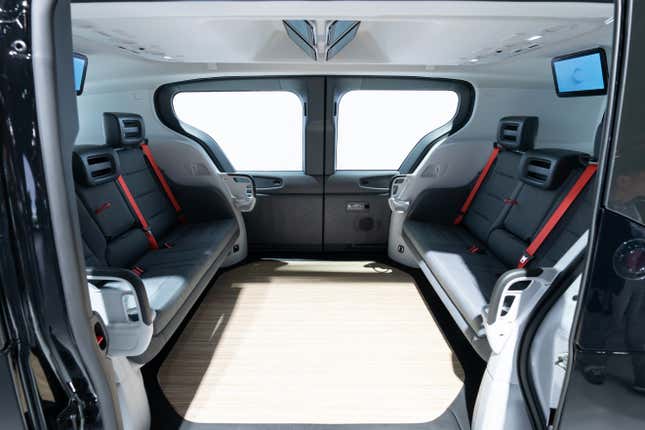General Motors is throwing in the towel on its bespoke autonomous vehicle that doesn’t have a steering wheel called Origin. Instead, its Cruise self-driving unit is turning its focus to development efforts on the next-generation Chevy Bolt.
Back in 2022, General Motors filed a petition with the National Highway Traffic Safety Administration in an effort to unleash 2,500 self-driving Origin vehicles (which have no human controls like brake pedals or a steering wheel) annually. To this day, NHTSA hasn’t done anything with this request, according to Reuters. Now, the Origin – with its subway-like doors and campfire seating – is on hold indefinitely, and there’s no word if GM will try to get it going in the future.
Here’s what a spokesperson for General Motors told Reuters:
“GM and Cruise are optimizing resources to focus development of our next autonomous vehicle on the next-generation Bolt instead of the Origin,” a GM spokesperson said.
“This shift creates a more cost-effective and scalable option for pursuing an autonomous future faster, while avoiding the uncertain path to regulatory compliance in the U.S. that could impede scaling of the Origin.”
In November of last year, GM said it would temporarily halt the production of the Cruise Origin after hundreds of ships had already been built. That was apparently “more than enough for the near-term when we are ready to ramp things back up,” according to a spokesperson. Apparently, it was way more than enough. This decision to pause Cruise production at its plant in Detroit cost the automaker about $583 million.

Here’s why General Motors has decided to forgo a bespoke self-driving vehicle, in favor of just converting one they already make. From the New York Times:
“We think from a regulatory perspective, and also from a cost perspective, at this point in time, we think the Bolt is a better solution,” [GM CFO Paul] Jacobson said in a conference call with reporters.
Eventually, Cruise will switch to a modified version of a redesigned Bolt that is expected to go into production next year. Mr. Jacobson said the new Bolt will be less expensive than the Origin.
There are a number of reasons why GM may have pulled the plug on the Origin, as Reuters explains:
Cruise faces a number of investigations – including by NHTSA, the Justice Department and Securities and Exchange Commission – after an October accident in which one of its robotaxis struck a pedestrian and dragged her 20 feet (6 meters). Cruise and GM came under heavy criticism after the accident and California revoked its permit to operate driverless vehicles.
Still, Cruise will soldier on without its bespoke vehicle. CEO Mary Barra reportedly said that in recent months, Cruise resumed testing of its robotaxis with human safety drivers in three cities and recently hired a new CEO. Previously, Barra has said the business could – theoretically – generate $50 billion in annual revenue by 2030, according to Reuters. However, the self-driving unit has only lost money so far – costing GM over $8 billion since 2017. In January, the automaker said it would cut Cruise spending by about $1 billion.
I just want everyone to take a moment and think about how many billions of dollars have been flushed down the drain on autonomy.
Update July 23, 2024, 3:50 PM: A spokesperson for General Motors reached out to Jalopnik and offered us the following comment:
“GM and Cruise are optimizing resources to focus development of our next autonomous vehicle on the next generation Bolt instead of the Origin. This shift creates a more cost-effective and scalable option for pursuing an autonomous future faster, while avoiding the uncertain path to regulatory compliance in the U.S. that could impede scaling of the Origin. The Origin does not include a steering wheel and brake pedals and uses campfire seating, a design that is currently not permitted.”

![GM’s Cruise Pumps Brakes On Steering Wheel-less Autonomous Vehicle, Will Use Next-Gen Chevy Bolt Instead [Update] GM’s Cruise Pumps Brakes On Steering Wheel-less Autonomous Vehicle, Will Use Next-Gen Chevy Bolt Instead [Update]](https://i.kinja-img.com/image/upload/c_fill,h_675,pg_1,q_80,w_1200/ce37a63a87e8bd07b5646daefef2e779.jpg)